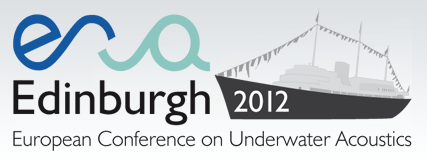
Salman Ijazssiddiqui@ualg.pt,
Antonio J. Silvaasliva@ualg.pt,
Sergio M. Jesussjesus@ualg.pt,
Institute for Systems and Robotics, University of Algarve
Campus de Gambelas, PT-8005-139 Faro, Portugal
Comments: download pdf file.
Ref.: in Proc. 11th European Conference on Underwater Acoustics,
Edinburgh (Scotland), 2012.
Abstract
The most prominent challenges in the present underwater communication systems are the multipath and the channel time variabilities which results in time and frequency spreading of the transmitted signal. The Passive Time Reversal (pTR) equalizer has been widely used in underwater communications because of its time focusing property which minimizes the time spreading effect of the underwater channel. The performance of pTR systems degrades rapidly in the presence of geometric variations. To solve this problem, Frequency shift Passive Time Reversal (FSpTR) was proposed. FSpTR equalizer tries to compensate for the geometric variations by applying an appropriate frequency shift in the channel impulse response estimates. The performance of the FSpTR equalizer degrades in the presence of complex multipath structure where each arriving path is affected differently by the environmental variations. In this case, a single frequency shift fails to compensate for all the environmental variations. An arrival based equalizer is proposed in this paper, which tries to compensate different arrivals separately by applying
different frequency shifts for each arrival.
In the proposed technique, the beamformer is used to separate different arrivals, based on the angle of arrival. Thus the technique was named Beamformed FSpTR (BF-FSpTR). The proposed BF-FSpTR equalizer was tested with the real as well as simulated data. The real data was collected during UAB’07 sea trial. During the experiment, the source was suspended by a crane and some deliberate source depth changes are made to study the performance of the communication systems in case of geometric variations. The results showed that BF-FSpTR outperforms FSpTR and provided a mean gain in mean square error (MSE) of 2.3 dB.